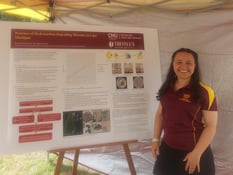Biology
The Bachelor of Science in biology provides students with a broad understanding of the discipline, from the molecular basis of life to the integration of life processes regulating the function of whole organisms. By emphasizing critical thinking, scientific communication and laboratory skills, the program equips students to succeed in scientific careers and graduate programs.
Program Benefits
- Gain hands-on experience at our campus farm, greenhouse and cadaver lab.
- Take advantage of our renovated facilities, state-of-the-art equipment and robust undergraduate research programs.
- Learn from faculty who possess high degrees in their fields, who have relevant and valuable real-world experience, and who make an effort to know you personally.
What to Expect
As a student in Trevecca’s Bachelor of Science in biology program, you’ll gain a solid foundation of understanding in core classes like biology, ecology, genetics, chemistry, statistical analysis and more. Plus, you’ll be able to take advantage of some incredible on-campus learning opportunities outside the classroom. Trevecca owns and operates a fully functional farm and greenhouse, allowing for unique research opportunities. You’ll also have access to our cadaver lab through a partnership with Trevecca’s PA program. And you’ll have local, national and international off-campus opportunities to gain experience through activities like summer internships, medical mission trips, community outreach and more.
Whether you are looking to enter the medical field or want to learn more about how science impacts the modern world, Trevecca's Bachelor of Science in biology degree will prepare you for a bright future. Our graduate acceptance rate in medical and PA schools is consistently well above the national average.
Why Choose Trevecca?
Founded in 1901 and a leader in online education for more than two decades, Trevecca helps students discover and pursue an individual calling by providing innovative instruction; cultivating a supportive, Christ-centered community; and establishing relationships that open doors.
Recognized nationally and locally for academic quality, Trevecca has earned a reputation for providing the world with servant leaders, problem solvers and difference makers. Trevecca’s holistic approach to education encompasses intellectual, social, emotional, physical and spiritual growth.
As a Christian university, we offer programs that explore the ways faith intersects with your field of study. This means you can gain your biology degree in a supportive Christian community with small classroom sizes and engaged faculty members who care about you and your goals.
Course Descriptions
Get details on all the courses you’ll complete as you work toward this degree at Trevecca.
Read MoreCareer Opportunities
With a Bachelor of Science in biology, you’ll have a wide-open career path. This degree positions you well for a variety of roles in laboratories, the medical field and secondary education. You’ll also be well prepared for postgraduate academics if you decide to continue your education.
Course Descriptions
Get details on all the courses you’ll complete as you work toward this degree at Trevecca.
General Biology I
BIO 1510
An introduction to fundamental concepts in the biological sciences including the organization of living matter, cellular structure and function, food production by photosynthesis, energy harvest, mechanisms of cellular reproduction, genetics, and evolution. Discussions of current scientific issues will also be included. Lecture and lab. Fee charged.
General Chemistry I
CHE 1040
The first course in a one-year sequence for students planning further work in chemistry. Topics discussed include atomic structure, periodic relationships, bonding, molecular structure, chemical reactions, thermochemistry, solids, liquids, and gases. Lecture and lab. Fee charged.
General Physics I
PHY 2110
Junior Seminar in Biology/Chemistry/Physics
PHY 3335/BIO 3335/ CHE 3335
Requires students to participate in professional development activities designed to prepare them to apply for summer research/externship positions, graduate school, medical programs, and/or jobs in scientific or technical fields. In addition, students will explore the integration of faith with their desired profession.
Senior Seminar in Biology/Chemistry/Physics
PHY 4335/BIO 4335/CHE 4335
Culminating seminar for biology majors and an opportunity to engage in the preparation of a literature review, present scientific data in the form of oral and poster presentations, and demonstrate content knowledge by means of an external assessment. In addition, students will draw upon their experience within the program of study to articulate the relationship between faith and science.
Calculus I
MAT 1510
A study of Cartesian and polar coordinates, parametric equations, vectors and vector-valued functions in 2 and 3 dimensions, limits, differentiation of functions with applications, integration of functions with applications, Taylor polynomials, and series. It is strongly recommended that students take PHY 2110 and PHY 2120 concurrently with MAT 1510 and MAT 1520, respectively.
General Biology II
BIO 1520
A study of diverse structures and functions observed in a variety of prokaryotic and eukaryotic organisms, with emphasis placed on plants and vertebrates. The study of the Kingdom Plantae will include investigation of plant life cycles and reproductive strategies. Topics including respiration, digestion, and reproduction will be introduced in the study of vertebrate animals. An introduction to ecology and the impact of humans on a variety of organisms will also be included. Lecture and lab. Fee charged.
Microbiology
BIO 2820
A survey of microscopic organisms with emphasis on bacteria and fungi. Classification, morphology, cultivation, and identification will be studied in both lecture and lab. The role of these organisms in the ecosystem, industry, and disease will also be discussed. Lecture and lab. Fee charged.
Ecology
BIO 3040
A course that promotes the understanding of ecosystems as a whole and the influence of humans as top predator to either balance and preserve or disrupt and destroy these systems. The study will include interactions of ecosystem constituents, both community and population, and their contribution or detriment to the system. Emphasis will be placed on the use of biodegradable materials in all aspects of our life cycle and analysis of energy and resource flow that is more sympathetic with natural systems. Aquatic, terrestrial, and urban habitats will be studied in laboratory and field trips always with a focus on some measurable significant improvement within each semester. Lecture and lab. Fee charged.
Genetics
BIO 3720
Emphasizes Mendelian (classical) genetics. Additional topics include chromosome mapping in eukaryotes, chromosomal mutations, extranuclear inheritance, quantitative genetics, and population genetics. Genetic principles are applied to selected human traits as well as those of other organisms. Several genetic disorders of humans are considered. Lecture and lab. Fee charged.
Molecular Biology
BIO 3730
Emphasizes Molecular genetics. Topics include DNA structure, replication, and variation; expression and regulation of genetic information; recombinant DNA technology; and applications and ethics of biotechnology. Selected techniques in molecular genetics are included. Lecture and lab. Fee charged.
General Chemistry II
CHE 1050
The second course in a one-year sequence for students planning further work in chemistry. Topics discussed include solutions, kinetics, equilibrium, acids and bases, thermodynamics, and electrochemistry. Lecture and lab. Fee charged.
Organic Chemistry I
CHE 2010
The first course in a one-year sequence in organic chemistry. Topics discussed include organic structures, functional groups, stereochemistry, reactions, oxidation and reduction, spectroscopy, chromatography, and the chemistry of alkanes, alkenes, alkynes, alkyl halides, alcohols, and ethers. Lecture and lab. Fee charged.
Organic Chemistry II
CHE 2020
The second course in a one-year sequence in organic chemistry. Topics discussed include the chemistry of dienes, carbonyl-containing compounds, aromatics, and amines. A brief introduction to biochemistry is also covered. Lecture and lab. Fee charged.
Statistical Analysis for the Sciences
MAT 1350
An introductory statistics course with an emphasis on exploratory and inferential techniques for analyzing and modeling data. Topics include descriptive statistics, regression, probability distributions, confidence intervals, hypothesis testing and experiment design. Statistical software is implemented throughout the course.
Introduction to Computer Technology for the Sciences
SCI 2150
A hands-on introduction to computer-based measurements, automation, and graphical programming for the sciences. The LabVIEW graphical programming environment will be introduced and used to write software applications that collect, display and analyze experimental data. Automated experiments in the areas of biology, chemistry and physics will be designed and implemented. Topics such as sensors, signals, data acquisition, error analysis, and noise will be explored. The use of standard office spreadsheet, word-processing, and presentation software for scientific data analysis and reporting will also be emphasized. Lecture and Lab. Fee charged.
Biology Electives — 12 hours
*8 hours must be 3000 level or higher; BIO/CHE 3510 and BIO/CHE 3520 will not qualify if taken to satisfy Chemistry minor
General Electives — 7 hours
*For a complete list of courses, tracks and other relevant information, view the program's course catalog.




